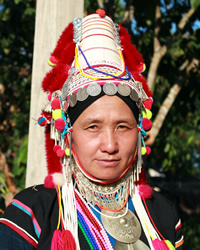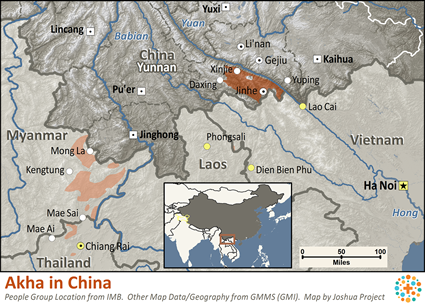Luma Akha inhabit several villages in the Boun-Tai District of Phongsali Province in northern Laos. They live almost directly on the Laos-Myanmar border, near the Eupa Akha. Even though they acknowledge historical kinship with the Eupa Akha, the Luma Akha have little to do with them.
Despite their close proximity to Myanmar, most likely almost all of the Akha now living in Laos migrated south from China. Only one or two small groups are believed to have entered Laos from Myanmar. The area inhabited by the Luma Akha is north of the infamous Golden Triangle, where the nations of Laos, Myanmar and Thailand meet. The Golden Triangle has long had a reputation as one of the main drug-producing areas in the world. Today, one in ten Akha are said to be addicted to opium.
In addition to being able to recite their long genealogies, which reach back more than 60 generations, the Akha are also able to remember the migration routes their ancestors took to arrive at their present locations. "The farther back they go with their recitation of the names of forefathers and former dwelling places, the fuzzier the picture becomes. Even so, Akha from China, Burma, Thailand, and Laos, basically agree in their repetition of genealogy and migration routes. This is amazing for people who have no written language and are spread over so vast an area."
The Luma Akha are animists and ancestor worshippers. One Burmese evangelist, when he visited an Akha village in Myanmar, reported, "As we approached the village, we saw evidence that the battle we would be fighting was spiritual, not physical. Above the entrance way to the village were animal skulls and demonic symbols. There were certain altars around the perimeter of the village still fresh with blood from sacrificed dogs, goats and chickens. Dog intestines had been placed around the village in an attempt to placate the evil spirits."
Many tourists and visitors to the Akha do not realize the deep spiritual bondage to spirits they live under, which explains why thousands of Akha have embraced Christ in Thailand and Myanmar. In Laos, however, most have yet to hear.
The Luma Akha people need to allow Jesus Christ into their families and communities.
Pray for open roads for the flow of the gospel.
Ask God to raise up laborers to plant churches among the Luma Akha.
Pray that the Kingdom of God would soon come among the Luma Akha, that many would find new life.
Scripture Prayers for the Akha in China.
Operation China, Asia Harvest, Copyrighted © Used with permission.
| Profile Source: Joshua Project |



























